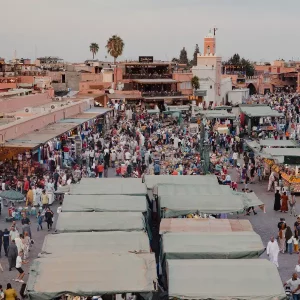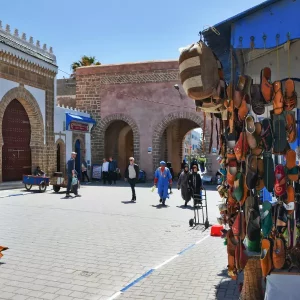How to Haggle in Morocco: A Guide to Mastering the Art of Negotiation
A Guide to Mastering the Art of Negotiation: How to Haggle in Morocco ?
Introduction
Morocco provides a distinctive shopping experience where bargaining is an integral part of the culture thanks to its colorful marketplaces and busy souks. To acquire the greatest discounts and fully immerse yourself in the local culture, regardless of whether you are an experienced tourist or a first-time visitor, you must learn the art of haggling. We’ll walk you through the ins and outs of negotiating in Morocco in this book, covering everything from fundamental manners to more sophisticated advice that will help you through the minefield of haggling with assurance and respect.
1. Understanding the Importance of Haggling in Moroccan Culture
Morocco has a strong heritage of trade and business, and bargaining is a common practice in the country’s marketplaces. Instead of being just a transaction, the locals see it as a social connection. It allows you to get to know the vendor better, convey how much you value fine craftsmanship, and participate in lighthearted conversation.
2. Choosing the Right Market and Time to Haggle
There are several marketplaces in Morocco, each specialized in certain items. You must pick the market that best suits your purchasing preferences from the crowded souks of Marrakech to the classic marketplaces in Fes. Additionally, going to the market first thing in the morning provides you an edge since vendors could give the first customers greater prices.
3. Polite Gestures and Greetings
In Moroccan tradition, courteous greetings and actions go a long way toward starting a successful bargaining transaction. Begin by greeting the vendor and expressing sincere interest in their products. This creates a cordial setting for discussions.
4. Demonstrating Interest without Commitment
Show interest in the goods you like while perusing the market stalls, but refrain from making a hasty purchase. Show your respect for the product’s distinctiveness or workmanship, but make it apparent that you are also considering alternative possibilities.
5. The Art of Starting the Negotiation
The hardest part of negotiations is frequently getting started. Start with a counteroffer that is markedly less expensive than the asking price. This gives you and the vendor room to negotiate and ultimately reach a reasonable price.
6. Mastering the Back-and-Forth Dance
The customer and seller engage in a back-and-forth dance during haggling in Morocco. Be ready for counteroffers from the seller as the buyer. Keep a good outlook, be patient, and enjoy the process.
7. Knowing When to Walk Away
It’s alright if a vendor refuses to lower their asking price occasionally. Thank the seller formally and be ready to leave if you feel that the discussion is not moving in the correct manner. This frequently results in the seller revising their offer.
8. The Power of Simultaneous Bargaining
Consider haggling for a package price if you’re purchasing many goods from the same vendor or from booths that are close to one another. When you negotiate simultaneously, you might use your purchases as leverage to possibly achieve a better total deal.
9. Respect Local Customs and Etiquette
Always keep in mind that haggling is a social activity, thus respect should always be maintained. When negotiating, try to avoid being confrontational or rude since this can ruin the process for both sides.
10. Closing the Deal
Once you’ve come to a compromise, it’s time to finalize the transaction. Before paying, verify the pricing and give the item a thorough inspection. Thank the seller for the transaction, and feel free to express your gratitude if you had a good experience.
11.Tips for Experienced Hagglers
Consider acquiring a few fundamental Arabic words if you’re an experienced barter trying to boost your abilities. The locals will be impressed by this gesture, which also shows that you are really interested in their way of life.
12. The Dos and Don'ts of Haggling
Let’s go through some crucial dos and don’ts to guarantee a good haggling session. These include being aware of the local currency, showing consideration for the vendor, and being sensitive to cultural differences.
13. How Haggling Benefits Local Communities
Not only can haggling result in the lowest price, but it also benefits the neighborhood. You may directly support local makers’ livelihoods and the continuation of traditional crafts by making purchases from them.
14. Handling Haggling Stress
Although it might be exhilarating, haggling can also make some people feel stressed or anxious. Recognize when it’s appropriate to unwind, take a break, and return to the market with a new outlook.
15. Conclusion
You may interact with the local culture and bring home one-of-a-kind items through haggling in Morocco, which is a fascinating experience. You can make bargaining a positive and fun experience by being aware of the traditions, appreciating the back-and-forth dance, and showing respect for the vendors.
FAQs
Q1: Is haggling expected in every shop in Morocco?
- The majority of Moroccan stores and markets do allow for haggling. Both residents and visitors use it as a fundamental component of the shopping culture to haggle over pricing and locate the greatest deals.
Q2: Are credit cards widely accepted in Moroccan markets?
- Although credit cards are increasingly accepted in major cities and tourist destinations, cash is still more often used, particularly in small marketplaces and souks. Carrying adequate cash for your purchases is advised since some smaller shops might not take credit cards.
Q3: Can I haggle over food prices in Morocco?
- Morocco does not use price haggling for food. Prices are often set at restaurants and at food stands. In the same market areas, you may still haggle over costs for non-food products like handicrafts and souvenirs.
Q4: What are some traditional Moroccan souvenirs to haggle for?
You may barter for a variety of traditional Moroccan mementos, including:
rugs and carpets made by hand such as belts, shoes, and purses are made of leather.
ceramics and porcelain
Lanterns and metalwork
Moroccan traditional tea settings with spices
handmade silverware and jewelry
How to Haggle in Morocco: A Guide to Mastering the Art of Negotiation


How to Haggle in Morocco: A Guide to Mastering the Art of Negotiation
Note : If you need a city Tour or a trip Let us know, The Tour Can be Customized Depending on your Needs ( Time , Dates , pick up and drop off locations…ect)
Whether you’re traveling as a couple, a small group of friends or family, whether you crave history, adventure, culinary delights or a peaceful getaway, we can help you create the dream holiday at your dream destination. Contact us
